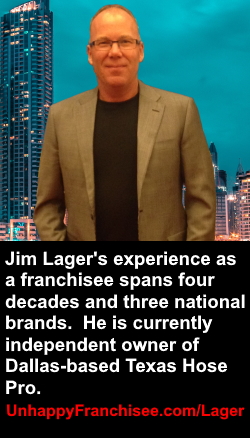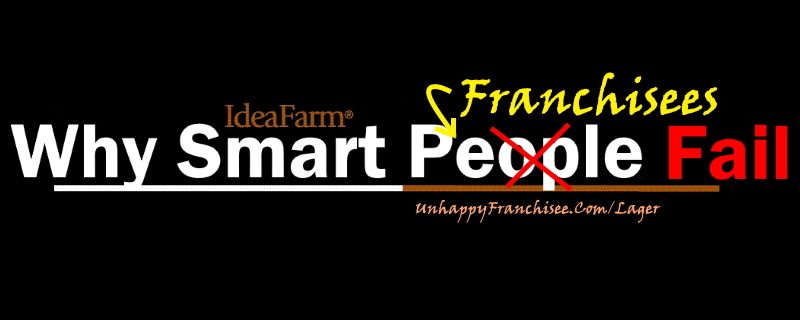Franchise Ownership? There’s No Such Thing
“Franchise Ownership? There’s No Such Thing.” Veteran franchisee Jim Lager dispels the myth that franchisees are business owners. They own nothing, says Lager. The real value in operating a franchise is education & experience.
(UnhappyFranchisee.Com) Jim Lager has been a franchisee of three national brands over the span of four decades. The biggest misconception about franchise ownership, according to Lager, is that it exists. By Sean Kelly
Franchise sellers describe franchising as the safest route to the American Dream of business ownership.
 “Nonsense,” says Jim Lager. “Franchisees aren’t business owners. They are business renters.”
“Nonsense,” says Jim Lager. “Franchisees aren’t business owners. They are business renters.”
“Tell me…” Lager asks. “What do franchisees own?
“The trademarks? No. The trade name they build recognition for over the years? No.
“The goodwill and customer relationships they take years to earn? No.
“Are they free to sell their business to whomever they like with terms that they decide? Definitely not.”
Lager says that when one reaches the end of their franchise term, it’s like turning over a leased car. You hand over the keys and walk away.
“You own nothing,” says Lager.
“You don’t OWN a franchise business. You RENT a franchise business.”
– Jim Lager
Lager’s insights are based on four decades as a franchisee of three national brands: Snap-On Tools, AmericInn lodging and a national mobile hose replacement service.
“There are benefits to renting a business,” says Lager. “As long as you know that that’s what you’re doing and why you’re doing it.”
“Operating franchise businesses has provided me with a business education,” says Lager. “Each franchise system I’ve been part of provided me with systems, tools and principles to run their business model profitably, and trained me in how to use those tools. They provided support in things like HR, inventory management, marketing and accounting. I have four decades of hands-on experience building multi-million dollar businesses. I could have never received that experience in school or on my own.”
“But could I have used that education to open a competing business?” Says Lager. “No way. The franchise agreement imposes a non-compete clause that makes it virtually impossible to open a competing business and use the experience and education I’ve acquired.
“A lot of my fellow franchisees are upset when they realize that, after decades building their business, franchisors rarely let a franchisee sell their business for more than the hard assets are worth. I wasn’t angry because I understood the business wasn’t mine to sell.
“Understand, it’s the franchisor’s field, their ball, their referee and their ball game. Plus, they made up the rules.”
“You won’t get rich with a franchised business. But you WILL get educated.”
– Jim Lager
“Honestly,” Lager says. “Very few franchisees ever get rich operating a franchise business. But if they’re smart, they are going to get an education.”
“I’ve owned franchises from three separate brands. I followed their systems faithfully and diligently. Don’t get me wrong, I made a good living. But I didn’t get wealthy when the franchisors bought out my successful territories. That’s not how franchising is supposed to work.”
After four decades wearing a franchise brand, Jim Lager is now striking out on his own an independent distributor for Parker Hose Products in Dallas TX.
 Sean Kelly is publisher of UnhappyFranchisee.Com and President of IdeaFarm Press, a Relentless, Inc. company.
Sean Kelly is publisher of UnhappyFranchisee.Com and President of IdeaFarm Press, a Relentless, Inc. company.
ALSO READ:
FRANCHISE DISCUSSIONS by Company
ARE YOU A FRANCHISEE, FORMER OR PROSPECTIVE FRANCHISEE? ARE YOU A FRANCHISOR OR EMPLOYEE OF A FRANCHISOR?
WE WANT TO HEAR WHAT YOU THINK. PLEASE SHARE A COMMENT BELOW.
TAGS: franchise, franchise opportunity, franchise complaints, franchise advice, franchise opportunity, how to buy a franchise, buying a franchise, Snap-on Tools, AmericInn franchise, Why Smart Franchisees Fail, Why Smart People Fail, unhappy franchisee


Mr. Lager has no clue. He is totally off base. Maybe the fact his he had nothing to sell. He clearly is grinding an ax. Many franchisees are able to build wealth that can last for generations.
Ron:
Could you please elaborate on what you mean… without the ad hominem attacks. It’s neither fair nor correct to say Jim Lager has no clue. He’s been through this process with three national franchises. That is his experience… It might not be true with every franchise chain.
Can you give examples of franchisees who built true wealth, other than the “very good living” Lager acknowledge?
He’s not the first one to object to the term “franchise owner.”
Seems like a valid point.
Franchisees don’t own the “franchise,” the franchisor does, right?
Most franchisees lease a system and a trademark for a set term, and when that term is over they must walk away (often with a noncompete).
I think it’s an interesting topic for discussion.
What do franchisees own?
Do many cash out with a profit when they wish to sell, or are they just getting compensated for their assets?
ADMIN
In reality, Franchisees are glorified managers and not independent businesspeople as claimed by 7-Eleven Inc and they’re mostly in full control of its day to day operation. Franchisees are used and abused by 7-Eleven Inc according to their convenience. Nothing will change under the current upper – management because they are only concern about their compensation package on their way out without any consideration of the word ” Fairness “.
The franchisee is renting a trademark, using a business system, with some transfer rights. Yes, this is less than full business ownership.
But you’re by yourself anytime the franchisor doesn’t want to be held responsible for something it is doing wrong.
The franchisor selects its rhetoric to match whatever its needs are at the moment. During franchise sales, “Go into business for yourself but not by yourself (and give me a hefty franchise fee so you won’t be alone).”
And when something goes wrong: “You’re in independent company, franchisee, and it’s all on you” (even when…. and especially when…. the franchisor is at fault).
In the psychology world we call this “abuse.”
Add a power differential to the situation (as is found in franchise agreements and as is apparent in any relationship with an extreme financial difference)….. and you have a very serious offender-victim relationship.
And this serious offender-victim relationship is happening en masse, is affecting the economy, and is being funded by the taxpayer due to the fraudulent use of SBA lending.
Depends on how large and powerful the franchisee is, viz. number of units.
It depends on the power differential between the franchisee and the franchisor.
The number of units a franchisor has can never justify the franchisor deceiving the franchisee to take a franchise fee or the franchisees’ life savings to grow the franchisors’ business.
Number of units is a red herring.
What is important is the power differential. The power differential is known because the franchise agreement puts it into writing and because, in almost all cases, the franchisee is going to the franchisor for “help” and “support” to “go into business.” The relationship begins with a power differential because it is inherently built on a power differential.
Most “new” franchisees don’t understand this power differential until after they sign on the dotted line, become “part of the family” and there is a problem. Going in, they believe the franchisor truly is there to “help” and “support” them – a very general term that is usually very narrowly defined in the agreement. If the franchisee really gets into trouble, the help he will likely get is the help to “leave the family”.
As a former franchisee for over 17 years, I agree with much of the sentiment of this article.
In many cases, buying a franchise is in essence, buying a job; however, if you are smart enough or lucky enough to get into the right franchise, at the right time, it can be a road to significant wealth. Potential franchisees should always hire a GREAT attorney (with tons of franchise experience), really do good due diligence, and don’t sign the agreement without a full understanding of, among other things, the non-compete clause, the almost unlimited personal guaranty, and virtually unlimited control the franchisor can exert if it wishes. Once the agreement is signed, the franchisee’s negotiating position is void of leverage.
Hiring a great attorney and doing due diligence will work when the FTC is actually regulating the industry. It’s not very effective right now because franchisors have little incentive to disclose honestly.
Any agreement that gives all power to one party once the agreement is signed is a faulty agreement. The fact that this is the status quo demonstrates that the industry is corrupt.
At this point, I think the answer is getting attorneys with criminal prosecution experience to file civil RICO lawsuits against franchisors to recover some of the money franchisors and others have corruptly stolen.
Franchisees need to get out of the traps set up for them in contract law and due to the fact that the Franchise Rule is completely unenforceable (because franchisors convinced the FTC not to give franchisees a private right of action when the Franchise Rule was revised in 2007….. another indication of corruption).
Civil RICO with the right prosecutors is way out… and the path to restitution for fraud victims.
A wave of civil RICO lawsuits may also help reform an industry that up until now has been completely resistant to change because the people making the rules are making the money.
Corruption.
I agree with you, and was forced to wage a nasty battle with a large franchisor and it’s parent company for over a year. With virtually unlimited resources, their goal was to run me out of money. They ultimately settled, and I survived, with a very keen understanding of the legal inequality of the relationship.
I was blessed to have good lawyers, and a judge that did not like bullying tactics by a franchisor and parent. Most franchisees that do battle ultimately lose most, if not everything because the cards, and the law, are strongly stacked against them. And you are right, a franchisee should never look to the FTC for help. Many people that sign franchise agreements just don’t understand all of this, thus my hope they will find a good franchise attorney before they sign, understand the legal traps that are built into most every franchise agreement, and go in with their eyes at least partially open.
While I do believe there are some good franchisors out there, I am not convinced there are any good franchise agreements.
Bill Bandy
Agreed.
And it is never franchisees’ fault for not doing enough to investigate prior to signing a franchise agreement. The system is set up to deceive them.
Deceit = fraud. It’s pretty simple.
The system supports fraud. And there are plenty of people intentionally taking advantage of that fact. Many parties are involved in the deceit.
In civil RICO, multiple party involvement means multiple defendants.
I invite you to keep an eye on my podcast. My co-host is an attorney with many years of RICO experience.. Our next series of podcasts will be about the Reade and Biden allegation and what the rest of us can do to figure out reality as we look at the problem from afar.
We’ll address offender patterns and victim behaviors in that context and then, later, move on to franchising as one of our future topics. Our plan is to get multiple RICO trial attorneys in different jurisdictions with criminal prosecution experience involved. We’ll be looking for victims who weren’t as fortunate as you and who didn’t settle because they couldn’t.
It is completely reasonable for people to believe in the FTC and its apparent regulations before they sign a contract.
This is RICO RICO RICO.
Bill Bandy What started the fight? Thanks.
Regardless of Bill Bandy’s answer, I have plenty of case studies in which the franchisor started the lawsuit with the objective of taking everything in the name of “enforcing the contract.”
The civil litigation is part of the corruption. There is little franchisees can do under contract law and without a private right of action.
Civil RICO is the answer.
It was a complex set of facts and circumstances that had developed after 3 major changes in ownership of the franchisor.
Anne Janai (McMullin),
My experience is that new franchisees sign contracts following discovery days, and visits with franchise sales staff that are designed to get them fired up about the opportunity.
Down the road, those people they dealt with in the beginning will likely move on. The franchisor may even be sold, and new owners and their executives may make changes to the system that require additional franchisee expenditures, or other changes.
These are long term agreements – 15 to 20 years. The franchisee will be fighting to compete in the marketplace in their line of business. Unfortunately, they may also find themselves in a battle with their own franchisor, which no longer resembles the one they signed their agreement with.
The franchisee still must pay their franchise fees, and meet all other obligations (including the new ones that may be put in place by new ownership and management), even if these new rules cause their franchise to become unprofitable.
If a franchisee cannot, or refuses to pay their franchise obligations, and is defaulted by the franchisor, regardless of the changes made by the new management, they are very likely to lose their entire investment, and much more.
This is the whole issue with joint employer, or the classification as in the case of California AB-5. In words, the franchisors unequivocally claim franchisees are independent businesspeople, yet with many franchises, in their practice, you are what I define as a Franployee. (Franployee – Definition: A person who invests hundreds of thousands of dollars in a franchise, is treated like an employee, pay is not guaranteed, has no rights.) Others have called it indentured servitude. It varies greatly by franchise, and it’s that level of control franchisees need to be concerned about because that is what eats away at any equity in their franchise. 7-Eleven and the janitorial franchises are some of the worst offenders.
Keith Miller, so are you, like me, now in favour of collective bargaining between franchisors and franchisees?
Michael (Mike) Webster, I’ve always been in favor of franchisees negotiating with their franchisor, or collectively advocating on franchisee issues. “Collective bargaining” is often used in the union environment, and franchisors love to throw the anti-union sentiment at those words to try to crush franchisees working together. While franchisor groups love to call out franchisees getting together “unionizing”, franchisors band together too, but never use those words. Yes, it’s semantics, but it gets used against franchisees trying to collectively advocate on behalf of their interests.
Keith Miller It is very difficult for franchisees to see themselves as a collective or needing something similar to a union.
The instinctive reaction to focus on being independent instead of interdependent.
Michael (Mike) Webster, last week a franchisee stated you me that the franchisor holds all the cards. I disagree, it’s the franchisee money that fuels the industry. I replied to that franchisee that I believe the franchisees hold the cards, they are just afraid to play their hand.
Keith Miller My position is very close to yours — I think that the franchisee was referring to a specific bargaining problems regarding releases.
Michael (Mike) Webster, actually it had to do with a promotion. Franchisees, in general are against it, but in the end, still honor it. If franchisees really stood firm, and say 80% didn’t honor it, the promotion would quickly go away.
Keith Miller Hmm, odd.
Both Joe and I are against discounts — in favour of some LTOs.
Promotions by franchisors which improve gross but detract from net are predatory devices.
In one of my early letters to the FTC (when I still believed the FTC was actively listening), I called it “indentured servitude.” That seems to fit.
I’m a writer. And I have experience making different arguments using language. That gives me the ability to quickly analyze the way others are using language to influence.
One thing I’ve noticed in franchisors’ written arguments to Attorney Generals’ Offices after they’ve been reported and the AG is questioning them, is that they use the idea that the franchisee is an independent business to blame the franchisee for any actions they don’t want to be held accountable for.
It’s a stupid argument, because obviously in the franchising world, franchisees are following franchisors’ business models, but that doesn’t stop franchisors from making it.
They want the best of both worlds. They want to be in charge of how the business is run. -And- they also want to blame the franchisee for anything that might be amiss in how the business is run.
Franchisors’ strategy is to make franchisees scapegoats. Franchisees must do as they’re told, but when something is wrong, it’s the franchisees’ fault for taking the action (as they were told) because franchisees are independent owners.
many franchisees don’t understand that they rent the brand. And if you rent the right concept you can make a lot of money.
Joe Caruso but, they clearly do own their own business. They can make wealth that lasts for generations. And many, if not most, franchise concepts permit you to sell/transfer, but they may have approval rights.
Ron Silberstein CPA CFE you don’t own the trademarks, branding, customer lists and may have something to sell if you have remaining years on the franchise term and/or renewals.
Joe Caruso in many cases you do own your customer list. Of course you don’t own the trademarks or branding. You didn’t develop them, either. It’s almost as if you are saying that it isn’t right, when it is perfectly right. You had the right to use someone else’s trademarks and brand. Most franchisees re incapable of developing their own business and concept Nd brand…as you know….and franchising allows them to be their own boss and be responsible for their own success. How many successful franchisees do you know (I know none) who have gotten to the end of their franchise term plus renewals snd has to just close down because the zor wouldn’t negotiate an additional term for them?
Ron Silberstein CPA CFE I am saying that it can be great and profitable to be a renter of an investment grade brand & franchise concept.
In response to the questions asked of me by the administrator – many franchisees sell their business for Profits. Sports teams, car dealerships, hotel owners, multi-units restaurant and coffee shop owners…..bought snd sold regularly, with some making hundreds of millions. These are franchises. Sandwich shop owners and pizza store owners….building a lot of wealth. You probably won’t see those people here on this site, by definition “unhappy franchisee.” A franchisee owns his/her business…the territory, its assets, everything about it. Business brokers all over the US have an inventory of Operating franchised businesses (“Resales”) for sale. I have seen profitable sales of 50+ Burger Kings, 20+ Buffalo Wild Wings, hotels, Taco Bell’s, Applebee’s, Little Caesars, and so on. Most franchise agreements have clauses addressing transfer rights, fees, rules. Having rights for 10 -30 or more years with the renewal rights – that is a long time (Under accounting rules, for example, having rights to lease for 30 years might make it do you are considered to own, not lease). In any case – I, as a franchisor, would be highly unlikely to refuse to renegotiate or extend the franchise agreement of a successful franchisee after 20 or 30 years.
Since when did the standard become “wealth that can last generations”? How many independent, non-franchised businesses offer that? Absurd.
Couldn’t agree more.. People use outlier success stories to sell the franchise model. The vast majority of people lose money. Just ask them